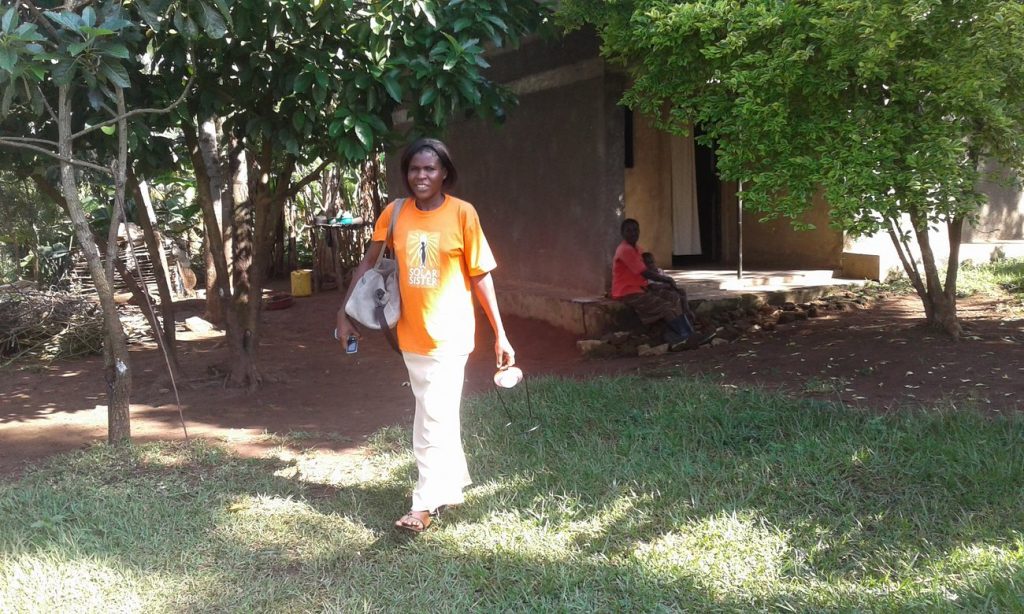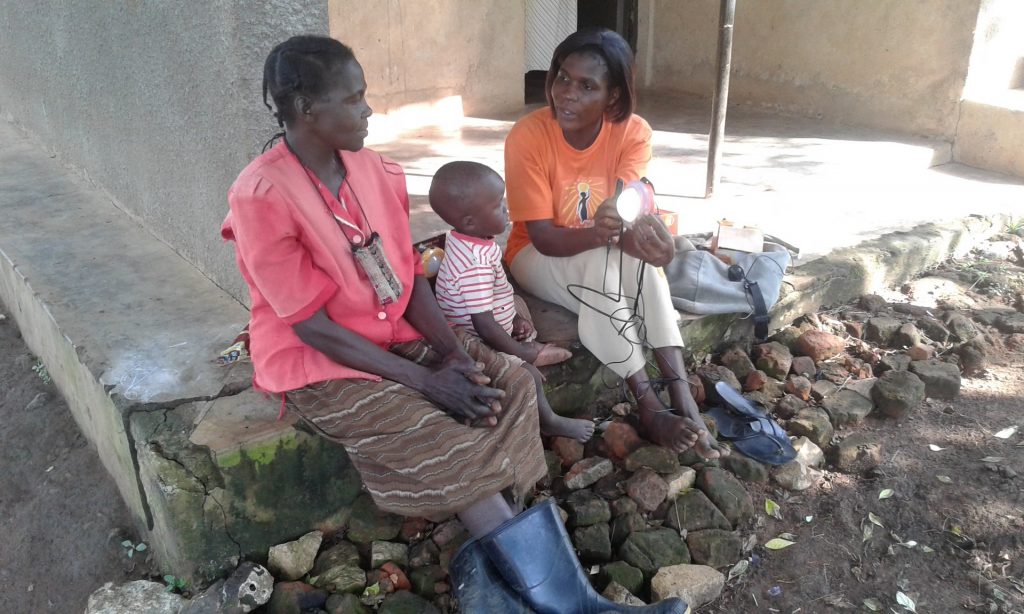
Harriet Nabukwasi is saving up. Having seen people claim her neighbour’s land, she is determined hers will not go the same way. The only way to protect the half-acre site in Mudokori village in Tororo, eastern Uganda, is to register the land and acquire a title.
“This land is our life,” says Nabukwasi, 31, who lives there with her three children and 56-year-old mother. “It is very important for my children.”
So far, she’s saved up enough to pay surveyors 100,000 Uganda shillings (£21) “to continue the process of registering my land”, she says. “Now, I even pay school fees for my children. I am happy now.”
Nabukwasi is able to save for her goal because of her work with Solar Sister, a not-for-profit social enterprise that has created a network of female entrepreneurs.
The organisation recruits women (and some men) in the most impoverished and remote areas of Uganda to sell affordable solar lamps, mobile phone chargers and fuel-efficient stoves. The women are self-employed, earning a 10%-20% commission.
Last month, an assessment of the organisation’s impact by the International Centre for Research on Women (ICRW) concluded that the Solar Sister model improved women’s lives, increased their incomes and made communities safer.
Solar Sister has a network of business development associates (BDAs) who recruit, train and support the female entrepreneurs.
“Entrepreneurs are encouraged to embrace ‘sisterhood’, where they often come together in groups to learn, share challenges, tips, and ideas. They later use their community networks of family and neighbours to sell [to],” says Marion Abbo, a BDA in Tororo.
As well as earning money, Nabukwasi now lights her house with a solar lamp, cooks on energy saving stoves, charges her mobile phone from home, and her children no longer have to rush to finish their homework before dusk. “Solar Sister has been a game changer,” she says.
At least 877 Solar Sister entrepreneurs now work in Uganda, more than three-quarters of whom are female. The organisation has attracted more than 2,000 entrepreneurs in Uganda, Tanzania and Nigeria since 2010.
According to Clare Achola, the Solar Sister Uganda country manager, the main goal is to allow women to be financially independent. It is not a full-time job, which means women can fit the work between domestic chores.
The ICRW research found, among other things, that income from clean-energy businesses allowed women to become financially independent and contribute to household earnings. Some women say their husbands and communities now have more respect for their opinions. The ICRW believes that household economic security has improved because of the money saved by no longer using expensive fuel such as kerosene.
Moreover, solar lanterns and better stoves produce fewer emissions, reducing respiratory and eye problems in the house.
“Solar Sister taps into the power of women’s social networks to bring energy access to the most hard-to-reach communities,” the report concludes.
Achola says Solar Sister is not making a profit, but relies on donations to continue its work. “We are making losses; whatever money we get is recycled. We get grants from donors to supplement us to get these products to the women.”
Solar Sister’s founder, Katherine Lucey, a former investment banker, says she was inspired to start the organisation after working for a family foundation in Uganda. The foundation was installing solar power in rural areas, and Lucey was impressed by the transformative impact “a simple light can have on [the life] of a rural family”.
“I was particularly inspired by one woman named Rebecca, in Mpigi [in central Uganda], who used solar light to improve her poultry business,” says Lucey. “I realised the importance of including women as part of the solution for energy access since they are the ones who manage the household and make the daily decisions about what type of energy is used.”
In Uganda, only 20% of the population has access to electricity (pdf) while more than 50% of rural households rely on open kerosene lamps. But such lanterns are fire hazards, emit toxic fumes and strain family budgets.
According to Lighting Africa, a World Bank group programme to increase access to clean sources of energy for lighting, Africa has a large off-grid population. More than 590 million people live with no connection to their national electric grid, exposing them to hazardous options.

Photograph: Alon Mwesigwa
An entrepreneur needs initial capital of at least 200,000 shillings (£42) to become a Solar Sister. “We want [the entrepreneurs] to take this as their business,” says Achola. “We tell them they have to buy the products we give them. If they don’t have money, we tell them to wait until they get it.”
Achola believes that when women pay for products at subsidised costs, it pushes them to work harder. Men are also encouraged to join and engage in their wife’s work, to avoid family conflict when she earns money.
John Owere, 60, says he took over his wife’s Solar Sister work when she became too busy with her teaching. Owere, a farmer and father of six, says the income he gets from selling solar lamps supplements his wife’s. “[The business] is seasonal; when it is time for harvest people buy and when there is famine, people use the money to buy food; when it is time for returning to school, people have to pay school fees,” he says.
Nabukwasi says there are challenges, especially when they have to travel long distances to meet potential buyers. This requires transport and phone calls, which can eat into the commission on sales.
Lucey says: “We coach them to learn to identify their business costs and to learn how to be profitable and run sustainable businesses. We empower them to know that the solutions are in their own hands.” For her, ending a culture of dependency on aid is crucial to help people escape economic hardship and deal with the issue of energy poverty.

